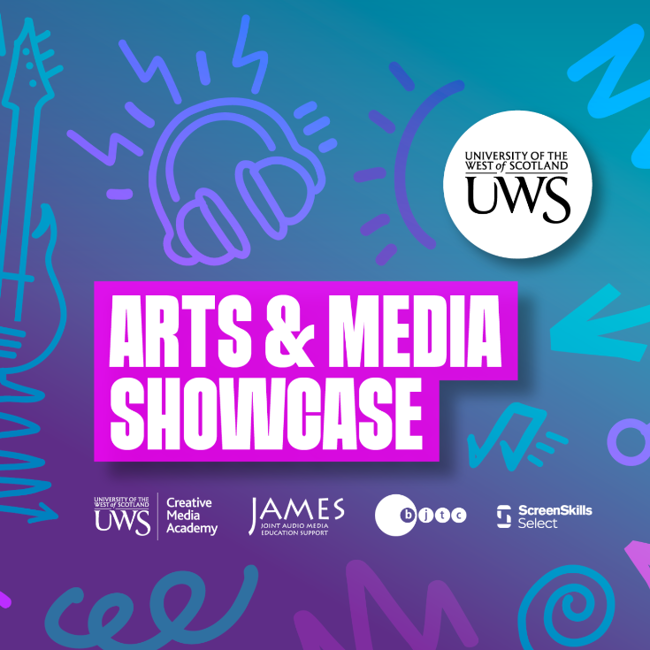Creative Media Practice
Award
MA
Duration & study mode
1 year full-time, typically 2 years part-time
School
Business & Creative Industries
Location
Ayr
Additional information
Course starting dates
-
Ayr: January, September

Our MA Creative Media Practice is ideal for those from various disciplines as well as industry professionals wishing to broaden their creative skills, knowledge and experience. This is a flexible MA suite of modules which will allow you to build up a strong portfolio of high-quality creative work across your chosen areas of practice.
The programme is aimed at graduates and industry professionals wishing to broaden their skills and explore and consolidate their creative identity across film, digital, media, photography, writing and performance.
The master's is delivered by expert practitioners, and will equip you for a creative media career, offering network contacts, the chance to build a portfolio, and essential practical skills. The MA also provides a solid foundation in practice-based research and an effective platform for pursuing further academic study at doctoral level.
Our course structure allows you to gain a personally tailored skill set, a detailed awareness of the fusion of creative, cultural, technological, social and political forces within the creative industries sector and screen and broadcast industries, and a deep understanding of the theories which underpin these areas.
We welcome Scottish, UK and international students and consider all applicants on an individual basis.
Don’t worry if your qualifications are not listed here, we take a range of factors into account when assessing your application and are happy to consider other alternative combinations of qualifications and experience
If you are applying with an EU or non-EU qualification, please check our Postgraduate Entry Requirements page which gives more information about country-specific entry requirements.
Entry to the MA is open to Honours graduates (minimum 2:2).
Applicants with relevant equivalent qualifications and/or professional experience will also be considered.
Overseas students must also meet UWS English language requirements.
For applicants whose first language is not English, the University sets a minimum English Language proficiency level. The qualifications below must have been gained within two years of the start of your course.
General English language requirements at UWS: International English Language Testing System (IELTS) Academic module (not General Training)
Exceptions to this level of IELTS scoring exist for some accredited or professionally-recognised courses (see section below for more details).
SOCIAL WORK DEGREES
For our BA (Hons) Social Work and MSc Social Work programmes, applicants are required to have an IELTS score as follows:
All stated English tests are acceptable for admission for both home/EU and international students for this programme:
For our research degrees (MRes, MPhil, PhD, DBA, DProf) applicants are required to have an IELTS score as follows:
For Health, Nursing & Midwifery courses that lead to, or require professional registration with the Nursing & Midwifery Council, applicants are required to have an IELTS or Occupational English Test (OET)*.
For such courses, the IELTS score is as follows:
* Note that the Occupational English Test (OET) will now be accepted in addition to IELTS as proof of a Nurse's English Language Competence (Nursing & Midwifery Council, 2019).
For our BSc (Hons) Applied Biomedical Science, BSc (Hons) Biomedical Science and MSc Advanced Biomedical Science programmes, applicants are required to have an IELTS score as follows:
For our Certificate of Higher Education courses, applicants are required to have an IELTS score as follows:
TOEFL IBT*: 78; no sub-test less than:
* Please note that TOEFL is still acceptable for admission to this programme for both home/EU and international students.
For international students, the Home Office has confirmed that the University can choose to use TOEFL to make its own assessment of English language ability for visa applications to degree level courses. We therefore still accept TOEFL tests taken in the last two years for admission to this programme.
West African Senior School Certificate of Education (WASSCE) including acceptance of WAEC Scratchcard*
*UWS will accept a WAEC scratchcard confirming that an applicant has achieved C6 or above as evidence of meeting English language requirement from Nigeria if the student graduated within the last 5 years. After 5 years applicants would be required to provide the WAEC Certificate.
Applicants who do not meet the minimum English language requirements have the option to study one of our preparatory and pre-sessional English courses. The UWS courses available are:
This is a flexible MA suite of modules which will allow you to build up a strong portfolio of high-quality creative work across your chosen areas of practice.
Core modules for the PgDip provide broad and detailed awareness and understanding of the Creative Industries, with embedded creativity and exposure to developing cultures of media convergence. Within the core modules and options students can select specific creative areas such as screenwriting, creative writing, motion graphics and digital filmmaking and documentary, tv/multiplatform development, audio and podcasting. Throughout the programme, students select which aspects and areas of their creative identities and skill sets they wish to develop.
There is a new strand within the programme focusing on multiplatform/ cross-media development and production (for broadcast and transmedia), starting in Creative Skills Development with the opportunity to carry this through to the final Master’s Creative Project.
For the Postgraduate Diploma (PgDip) stage, you will study the following modules:
Options include:
Following the diploma level taught modules, the 60 credit Master’s Creative Project gives you the opportunity to complete a sustained piece of professional creative work such as a feature-length documentary, a piece of creative writing, a multimedia product, an exhibition or a performance:
Throughout the course, you will gain the critical awareness, creative focus and contemporary production skills necessary to advance your career. Through a wide range of guest lecturers and industry mentors you will be exposed to experienced creative media practitioners and professionals.
LEARNING AND TEACHING
ASSESSMENT
Assessment methods will include:

In May 2024, we celebrated the creative endeavours of UWS students at our annual showcase and awards event on our beautiful Ayr campus.
The event boasted film screenings, broadcast production work, live music performances, art exhibition displays, theatre productions, songwriters’ circle and news-room journalism material. Elements of the event were also broadcast via UWS Radio.
You can now view the Creative Media Practice digital showcase to see the types of opportunities available to our students as part of their MA Creative Media Practice degree with UWS.
Graduates in Creative Media Practice have found roles such as independent producer, scriptwriter, TV development producer, documentary-maker, digital media producer/developer, artist filmmaker, motion graphics designer and as media or arts practice teachers and lecturers.
Our graduates have gained positions with the BBC, independent production companies, Toronto Film Festival, community media organisations, theatre companies (e.g. Gaiety Theatre, Ayr – learning resource co-ordinator), and with media or arts departments in various universities and colleges. Others have developed successful freelance careers in creative sectors such as photography, media and arts practice, and several have set up creative media businesses.
Work-related learning is available either as a placement in the creative industries and/or work on a professional project. Students are able to develop their professional practice in modules such as Creative Industries: Professional Practice.
A number of our MA Creative Media Practice graduates have also succeeded in gaining PhD study.

International students studying on the course, many of whom work in the creative sectors in their home countries as digital content creators, have come from USA, India, Pakistan, Zimbabwe, Nigeria, Bangladesh, Turkey and from across Europe.
All students should apply directly to the University through our online application system. Before you apply, you should check that you meet our entry requirements and you should have all your supporting documents ready.
The first stage of the process is to complete the initial application form. You will then receive a follow-up email with further instructions relating to your application including documents that you will need to forward to support your application, e.g. degree transcripts and certificates etc.
Most courses don't have a formal closing date, but they will close when they are full; apply early to avoid disappointment. There may also be funding deadlines that apply to you.
The Academic Technology Approval Scheme (ATAS) applies to all international students and researchers (apart from exempt nationalities) who are subject to UK immigration control and are intending to study or research at postgraduate level in certain sensitive subjects.
Students and researchers who are nationals of EU countries, the European Economic Area (EEA), Australia, Canada, Japan, New Zealand, Singapore, South Korea, Switzerland or the United States of America do not need an ATAS certificate.
An ATAS certificate may be required for certain taught postgraduate master's degrees for international students at UWS.
For the latest information on ATAS and details of eligibility and how to apply for a certificate check the UK Government's dedicated ATAS web pages.
Do you have a question about applying for this course? Get in touch. We are here to help!
£7,500 Total cost of tuition
£11,750 Total cost of tuition
£11,750 Total cost of tuition
£15,500 Total cost of tuition
£1,070 per module (20 credits)
£1,680 per module (20 credits)
£1,680 per module (20 credits)
£2,210 per module (20 credits)
We will always try to make sure that we publish accurate course information but we do not accept responsibility for any mistakes or omissions. We will also try to make sure that we deliver our courses in line with our published information. However, we may not always be able to do so and you can find further information about this in our enrolment terms and conditions.